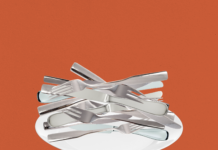The summer I turned eight, my great grandmother showed me her boobs. Mine were just about growing in. I was hoping they weren’t noticeable. I felt them
growing all the time even when I tried not to. They ached. They weren’t big enough to fill a bra yet, but you could see them poking out from underneath my pink unicorn T-shirt. We were
in the kitchen, my cousins were all playing outside, in the backyard. It was summer. She said, “You know, you have yourself some little titties.” Just like
that. No being shy or subtle about it. “You should be wearing a bra.” She then took off a cotton shirt she was wearing, one she made herself. “Nothing fits
this body or supports it like it used to. I am an eighty-eight year old woman. They don’t make clothes for people like me. Think I can’t live long enough
to be spending my money, I guess.” She dug into her home-stitched bra and pulled out her bare breasts. They looked like eggplants—not new fresh ones you
buy from the supermarket but ones left in the fridge for a while. “Horrified,
child?” she asked me, with a bit of an amused smile. I wasn’t horrified. I was amazed and wondered where the nipples were. I asked her where they were, and she pointed to them, at the very bottom. She said, “I was a real looker. All
the boys looked at me and liked me because of these. They all wanted to cop a feel. You’ll see for yourself.”
“Wow. How come they don’t look like the stuff they show in nudie magazines or the
movies?” I asked.
“Don’t be stupid, child. You think they’re going to photograph or put in the movies something that looks like these? For a joke they would. But this is for
real. This is what they look like if you don’t wear a bra … well, even if you do, no matter. It all ends up looking like this.” She shrugged,
lifted each breast and put them back in and added, “And by the way, the first time a guy says ‘I love you’ your legs will pry themselves open like this,”
she held up two fingers and opened them at the top slowly to form a peace sign, and as she did this, she added the sound effect of rusting hinges,
“Ewwrrrkk.”
“Please! You are embarrassing me.”
“You better get over it. I’ve got to tell you the things I know.”
“Well, that won’t happen to me.”
“No. Especially you. You think you’re so smart, but in the end that’s the thing that
will get you. That ‘I love you’ will do it for you. It gets everybody.” She laughed, showing me two rows of all her teeth. She still had them all at her
age. She said it was on account of her chewing tobacco. “S’why I lived so long. Well, that, and my husband died early.” Her teeth were all there, but they were coated around the edges in black. She always carried a basket of her
tobacco supplies wherever she went. It was filled with little jars and little plastic bags. She rolled the tobacco into a ball and put it underneath the
top right corner of her lip. And it would sit there the whole day. She’d spit red into an empty tin can. If you didn’t know what it was, you’d think she
was spitting blood. She carried the tin can in the basket. She poured out the spit pool when the smell got to be too much. The smell was like cigarettes
before they are lit up to be ash. She smelled like that. When she died, I knew she did. I could smell her and the tobacco for days with me even though she
was on the other side of the world, somewhere in Laos. When the phone rang with the news, I already knew what it was.
When it did happen to me, it didn’t happen like my great grandmother said it would. It was with a man who no longer had his young face. I was shown a photograph
of him when he was young. I looked at him and the photograph he showed me. The face in the photograph was still there, but it was at the very center, everything around it was wider and loose before me.
He did not say anything that had to do with love. And, afterwards, there was a pool of blood on the grey bed sheet. Looking at that alone, it really could
have been anything.



